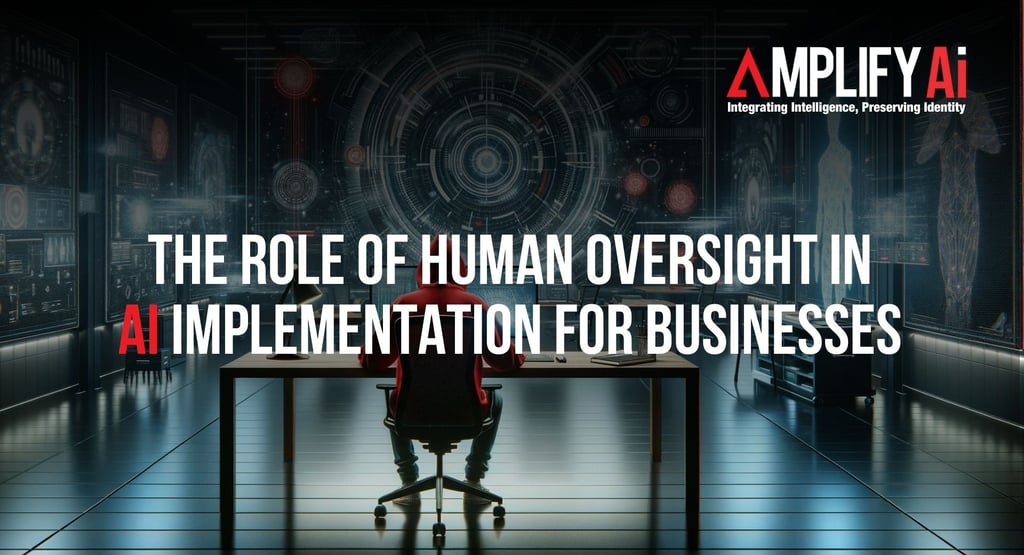The Role of Human Oversight in AI Implementation for Businesses
Ronsley Vaz
4 min read


AI implementation has become a buzzword in today's business world, with businesses of all sizes seeking to leverage the potential benefits of this technology. However, as AI continues to evolve, the importance of human oversight in its implementation cannot be overstated. Human management ensures that the technology is used ethically, responsibly, and in a way that benefits businesses, employees, and customers.
Imagine a scenario where a company automates their customer service operations using AI entirely. While this may seem like a smart move on the surface, AI may make decisions that negatively impact customer satisfaction without proper human oversight and intervention. For example, if the AI is not programmed to handle certain complaints or requests, it may provide irrelevant or unhelpful responses, leading to frustrated customers. In this case, the company would need to invest in human oversight to ensure that the AI makes decisions that align with its values and goals while still providing customers with the best possible experience.
Ensuring Data Quality
One of the most critical factors in implementing AI is ensuring that the data used to train AI systems is high quality. High-quality data is essential to improve the accuracy and reliability of AI models. It is crucial to gather relevant data free from potential biases and errors. Human oversight helps clean and verify data to ensure it is clean and relevant.
The lack of human oversight in AI systems can lead to biases, errors, and inaccurate results. It is essential to ensure that the data sets used are comprehensive and representative of the populations they're serving. The lack of diversity in data sets can result in biased or incomplete AI models, which can be detrimental to decision-making. Therefore, it is necessary to have a diverse team that can provide different perspectives and ensure that the AI system is fair and unbiased. In conclusion, human oversight is crucial to building reliable and accurate AI models that can improve decision-making, and it is important to ensure that data sets are comprehensive, diverse, and free from potential biases.
The Role of Human Oversight in AI Decision-Making
Artificial Intelligence (AI) is becoming increasingly popular in the business world, with more and more organizations implementing AI systems to improve their decision-making processes. However, AI systems are only as good as the data they are trained on and the algorithms used to interpret that data. This is where human oversight comes in. Human oversight plays a crucial role in ensuring that AI systems make ethical and unbiased decisions and in identifying potential gaps in AI decision-making processes.
Human intervention is essential to ensure that AI systems are making the right decisions. This is especially true regarding decisions that could have ethical or moral implications, such as those involving people's lives or livelihoods. Human oversight can help identify potential biases in AI algorithms and ensure that the decisions are fair and unbiased. Additionally, human intervention can help identify gaps in AI algorithms or data sets, helping to improve the overall accuracy and effectiveness of the AI system. Human oversight is crucial in ensuring that AI is used responsibly and ethically.
Addressing Ethical Concerns
As AI continues to be integrated into various aspects of business operations, ethical concerns surrounding the use of AI have become more prevalent. One of the key ways to address these concerns is by implementing human oversight in AI decision-making processes.
Human oversight allows for a more comprehensive evaluation of the potential consequences of AI decisions, particularly regarding issues such as privacy violations and bias. This oversight can help ensure that AI systems are being used ethically and do not cause harm to individuals or groups. Additionally, it allows for a more nuanced understanding of the factors that contribute to AI decision-making, which is crucial in avoiding adverse outcomes. As businesses continue to integrate AI into their operations, they must prioritize the implementation of human oversight to ensure the ethical and responsible use of this technology.
The Importance of Transparency
Transparency is critical in AI implementation, as it helps build trust between businesses and their stakeholders. Ensuring that underlying algorithms and decision-making processes are transparent and understandable to all stakeholders is vital. Human oversight is essential in ensuring that AI systems are fair and unbiased. Human oversight can help detect and correct instances of bias in the data sets used to train AI models, ensuring that they represent the populations they serve.
Moreover, transparency and human oversight are essential in promoting accountability in AI decision-making. In the absence of transparency and human oversight, AI systems can make decisions that have a significant impact on individuals and communities without any accountability. Therefore, it is crucial to ensure that AI systems are transparent and that human oversight is in place to promote accountability and ensure that the decisions align with ethical and moral values.
The Future of AI and Business
Artificial intelligence (AI) transforms businesses' operations, providing cost savings, increased efficiency, and better decision-making. As AI evolves, businesses must adapt to this new technological landscape. However, it is important to note that human oversight is crucial in AI decision-making processes to ensure that the outcomes are ethical and unbiased.
In the future, the job market will change, and new skills will become necessary to succeed in an AI-powered workplace. Businesses must invest in research and development to stay ahead of the curve and ensure they use AI most effectively and ethically. With its continued evolution, we can expect to see new use cases and applications emerging, and it is essential to consider how to ensure that AI is used for positive social impact. Transparency is key in AI implementation, and potential ethical concerns include privacy violations and bias. It's important to ensure that AI is fair and unbiased and to communicate the underlying algorithms and decision-making processes to stakeholders.
AI implementation offers significant benefits for businesses but comes with ethical considerations and challenges. The importance of human oversight in AI implementation cannot be overstated, as it ensures that businesses use AI responsibly and ethically. By prioritizing data quality, decision-making processes, transparency, and ethical concerns, businesses can leverage AI to drive positive change and achieve their goals.

Subscribe to the podcast
Subscribe now to "Amplify Ai" and let's set sail together on this exciting voyage towards business growth and success.



